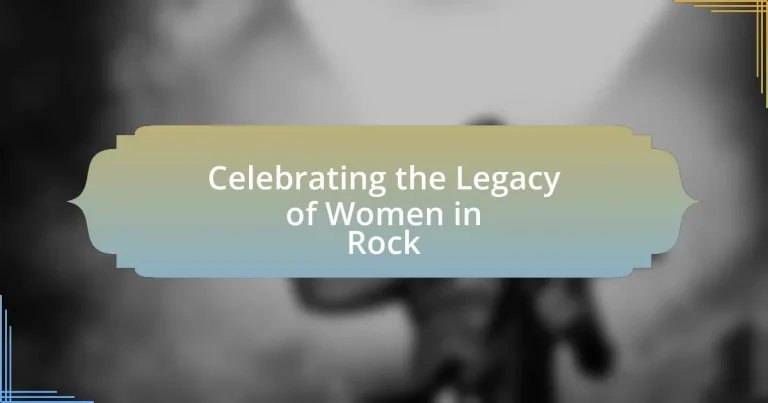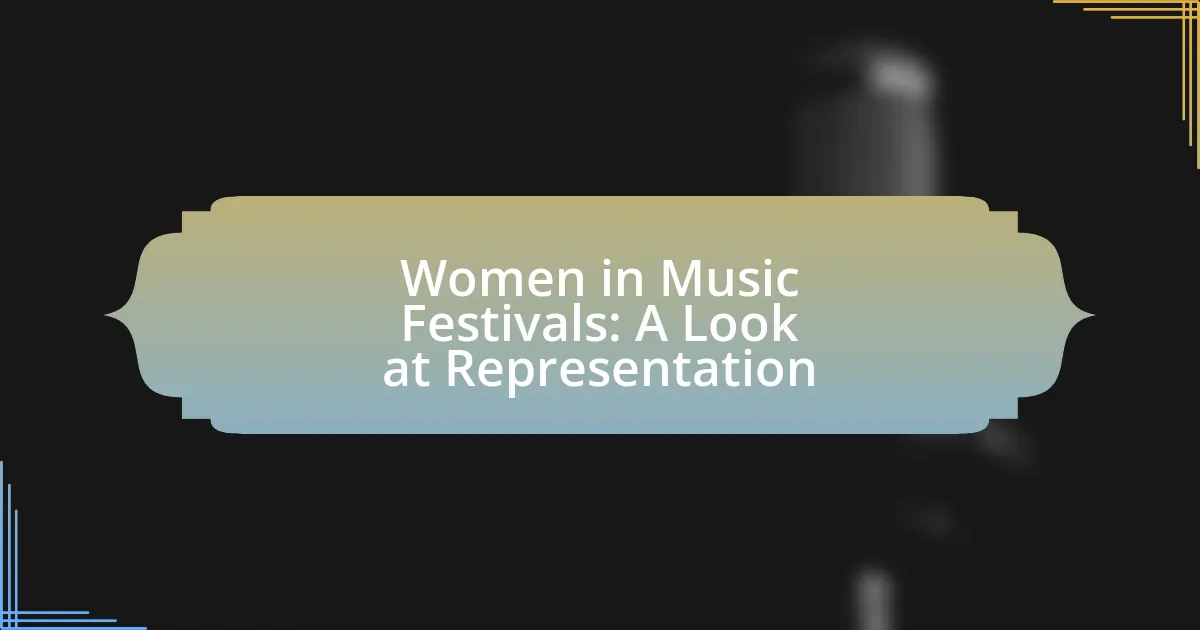The article focuses on the legacy of women in rock music, highlighting their significant contributions to the genre and the evolution of their roles over time. It discusses key milestones from the 1960s and 1970s, including the emergence of influential artists like Joan Jett and Janis Joplin, and the impact of the feminist movement on female representation in rock. The article also examines how contemporary female artists continue to inspire future generations, the importance of celebrating their achievements, and various initiatives that honor their contributions. Additionally, it addresses the ongoing challenges women face in the music industry and suggests practical ways to support and promote female musicians today.

What is the Legacy of Women in Rock?
The legacy of women in rock is characterized by their significant contributions to the genre, shaping its evolution and expanding its cultural impact. Pioneering artists like Joan Jett, Janis Joplin, and Stevie Nicks broke barriers in a male-dominated industry, influencing countless musicians and redefining gender roles in music. Their work not only paved the way for future generations of female artists but also challenged societal norms, leading to greater representation and recognition of women in various music genres. The Rock and Roll Hall of Fame has acknowledged this impact, with numerous female artists being inducted, highlighting their essential role in the history of rock music.
How has the role of women in rock music evolved over time?
The role of women in rock music has evolved from being marginalized performers to influential leaders and innovators within the genre. In the 1960s and 1970s, women like Janis Joplin and Joan Jett broke barriers, challenging gender norms and gaining recognition for their talent. By the 1980s and 1990s, female artists such as Debbie Harry and Alanis Morissette further solidified women’s presence in rock, showcasing diverse styles and themes. Today, women like St. Vincent and Haim continue to redefine the genre, not only as performers but also as songwriters and producers, reflecting a significant shift towards gender equality in the music industry. This evolution is evidenced by the increasing number of female-led bands and the recognition of women in major music awards, highlighting their integral role in shaping rock music’s history and future.
What were the key milestones for women in rock during the 1960s and 1970s?
Key milestones for women in rock during the 1960s and 1970s include the emergence of influential female artists, the establishment of all-female bands, and significant cultural shifts that challenged gender norms. In the 1960s, artists like Janis Joplin and Grace Slick gained prominence, with Joplin’s powerful performances and Slick’s role in Jefferson Airplane marking a departure from traditional female roles in music. The formation of bands such as The Runaways in the 1970s showcased female musicians in a rock context, paving the way for future generations. Additionally, the feminist movement of the era contributed to increased visibility and acceptance of women in rock, as seen in the rise of female-led acts and the inclusion of women in music festivals. These milestones collectively transformed the landscape of rock music, establishing a legacy that continues to influence artists today.
How did the feminist movement influence women in rock music?
The feminist movement significantly influenced women in rock music by promoting gender equality and empowering female artists to assert their identities and creativity. This empowerment led to the emergence of iconic female rock musicians such as Joan Jett and Patti Smith, who challenged traditional gender roles and expressed feminist themes in their music. The movement also fostered a supportive community that encouraged women to form bands, write songs, and take on roles traditionally dominated by men, thereby reshaping the rock music landscape. The impact of the feminist movement is evident in the increased visibility and recognition of women in rock, as well as the ongoing advocacy for equal representation in the music industry.
Why is it important to celebrate the contributions of women in rock?
Celebrating the contributions of women in rock is important because it acknowledges their significant impact on the genre and promotes gender equality in music. Women like Joan Jett, Patti Smith, and Debbie Harry have not only shaped rock music but also challenged societal norms, paving the way for future generations of female artists. According to a 2020 study by the USC Annenberg Inclusion Initiative, women comprised only 21.7% of artists in popular music, highlighting the need for recognition and support of female musicians. By celebrating these contributions, the music industry can foster a more inclusive environment that values diversity and inspires young women to pursue careers in music.
What impact have female rock musicians had on the music industry?
Female rock musicians have significantly transformed the music industry by breaking gender barriers and influencing musical styles. Artists like Joan Jett, Patti Smith, and Debbie Harry not only paved the way for future generations but also challenged societal norms regarding women’s roles in music. Their contributions have led to increased visibility for women in rock, with statistics showing that female artists now account for a growing percentage of festival lineups and chart-topping hits. For instance, in 2020, women made up 27% of artists on the Billboard Hot 100, a notable increase from previous decades. This shift has fostered a more inclusive environment, encouraging diversity in genres and inspiring young female musicians to pursue careers in rock.
How do female artists inspire future generations of musicians?
Female artists inspire future generations of musicians by breaking barriers and setting new standards in the music industry. Pioneers like Joan Jett and Aretha Franklin have demonstrated that women can excel in genres traditionally dominated by men, encouraging young female musicians to pursue their passions. Studies show that visibility of female artists in media correlates with increased participation of women in music; for instance, the rise of artists like Billie Eilish and Lizzo has led to a surge in young girls taking up instruments and songwriting. This legacy of empowerment and representation fosters a culture where future female musicians feel validated and motivated to express their creativity.

Who are the Pioneers of Women in Rock?
The pioneers of women in rock include artists such as Joan Jett, Janis Joplin, and Debbie Harry. Joan Jett, known for her work with The Runaways and her solo career, is often credited with breaking barriers for female rock musicians in the 1970s and 1980s. Janis Joplin, a key figure in the late 1960s rock scene, was one of the first women to gain prominence in a male-dominated genre, known for her powerful voice and emotional performances. Debbie Harry, as the lead singer of Blondie, helped to shape the punk and new wave movements in the late 1970s and early 1980s, showcasing the versatility and impact of women in rock music. These artists not only influenced their contemporaries but also paved the way for future generations of female musicians.
Which female artists are considered trailblazers in rock music?
Female artists considered trailblazers in rock music include Joan Jett, Patti Smith, and Debbie Harry. Joan Jett, known for her work with The Runaways and her solo career, was pivotal in the 1970s and 1980s rock scene, particularly with her hit “I Love Rock ‘n’ Roll.” Patti Smith, often referred to as the “Godmother of Punk,” blended rock with poetry, influencing countless artists with her debut album “Horses” in 1975. Debbie Harry, as the lead singer of Blondie, was instrumental in the punk and new wave movements, achieving commercial success with hits like “Heart of Glass.” These artists not only broke gender barriers but also shaped the sound and direction of rock music.
What contributions did artists like Janis Joplin and Joan Jett make to rock?
Janis Joplin and Joan Jett significantly shaped rock music by breaking gender barriers and influencing the genre’s sound and culture. Janis Joplin, known for her powerful, emotive voice and raw stage presence, brought a unique blend of blues and rock, paving the way for female artists in a male-dominated industry during the late 1960s. Her performances with songs like “Piece of My Heart” showcased emotional vulnerability and authenticity, which resonated with audiences and inspired future generations of female musicians.
Joan Jett, emerging in the late 1970s, contributed to rock by co-founding the all-female band The Runaways and later achieving solo success with hits like “I Love Rock ‘n’ Roll.” Jett’s rebellious attitude and commitment to rock music challenged societal norms and encouraged women to embrace their individuality and strength. Her influence is evident in the punk and hard rock genres, where she became a role model for aspiring female rock musicians.
Both artists not only expanded the musical landscape but also served as cultural icons, demonstrating that women could be powerful figures in rock music. Their legacies continue to inspire and empower women in the industry today.
How did these pioneers pave the way for future female musicians?
These pioneers paved the way for future female musicians by breaking gender barriers in a male-dominated industry and establishing a precedent for women in rock music. Artists like Joan Jett, Patti Smith, and Debbie Harry not only achieved commercial success but also challenged societal norms, proving that women could be both powerful performers and influential songwriters. Their contributions inspired subsequent generations, leading to increased visibility and opportunities for female artists. For instance, Joan Jett’s success with The Runaways and her later solo career demonstrated that women could lead rock bands and command respect in the music scene, influencing artists like Courtney Love and Alanis Morissette.
What genres of rock have been influenced by women?
Women have significantly influenced various genres of rock, including punk rock, alternative rock, and hard rock. Punk rock saw the emergence of female artists like Joan Jett and Debbie Harry, who challenged societal norms and inspired a generation. In alternative rock, figures such as Courtney Love and Fiona Apple brought unique perspectives and sounds, shaping the genre’s evolution in the 1990s. Hard rock has also been impacted by women like Ann Wilson of Heart and Lita Ford, who showcased powerful vocals and guitar skills, paving the way for future female musicians. These contributions highlight the essential role women have played in diversifying and enriching the rock music landscape.
How have women shaped the punk rock scene?
Women have significantly shaped the punk rock scene by introducing diverse perspectives, challenging societal norms, and influencing the genre’s sound and culture. Pioneering figures like Patti Smith and Debbie Harry not only broke gender barriers but also inspired countless female musicians to express their individuality and confront issues such as sexism and identity through their music. The all-female band The Runaways, formed in the 1970s, showcased women’s talent in a male-dominated industry, paving the way for future generations. Additionally, contemporary artists like Brody Dalle and Hayley Williams continue to push the boundaries of punk rock, ensuring that women’s voices remain integral to the genre’s evolution.
What role have women played in the development of alternative rock?
Women have played a crucial role in the development of alternative rock by shaping its sound, themes, and cultural impact. Pioneering artists like Patti Smith and Siouxsie Sioux broke gender barriers in the 1970s, influencing the genre’s direction with their unique styles and lyrical content. In the 1990s, bands such as Hole, fronted by Courtney Love, and the Breeders, led by Kim Deal, further established women’s presence in alternative rock, contributing to its mainstream success. Their work not only challenged societal norms but also inspired a new generation of female musicians, solidifying women’s integral role in the evolution of alternative rock.

How is the Legacy of Women in Rock Celebrated Today?
The legacy of women in rock is celebrated today through various initiatives, including music festivals, documentaries, and awards that highlight their contributions. Events like the Women Who Rock festival showcase female artists and their impact on the genre, while documentaries such as “The Punk Singer” focus on influential figures like Kathleen Hanna. Additionally, awards like the Women in Music Awards recognize the achievements of female musicians, further solidifying their place in rock history. These efforts collectively honor the pioneering work of women in rock and inspire future generations.
What events and initiatives honor women in rock music?
Events and initiatives that honor women in rock music include the Women Who Rock exhibit at the Rock & Roll Hall of Fame, which showcases the contributions of female artists to the genre. Additionally, the She Rocks Awards, presented by the Women’s International Music Network, celebrate the achievements of women in the music industry. The annual Girls Rock Camp programs empower young girls through music education and mentorship, fostering the next generation of female rock musicians. These initiatives highlight the significant impact women have had in rock music, promoting recognition and support for their contributions.
How do music festivals highlight female artists in their lineups?
Music festivals highlight female artists in their lineups by actively prioritizing gender diversity and representation in their programming. Many festivals have implemented initiatives aimed at achieving a more balanced lineup, such as the 2019 initiative by the UK-based festival Glastonbury, which committed to featuring at least 50% female artists across its stages. Additionally, organizations like Keychange advocate for gender parity in the music industry, encouraging festivals to pledge to equal representation. Statistics show that festivals that focus on female representation not only enhance the visibility of women in music but also attract diverse audiences, as seen in events like Coachella, which has increasingly included prominent female headliners such as Beyoncé and Billie Eilish.
What awards recognize the achievements of women in rock?
The awards that recognize the achievements of women in rock include the Women’s Music Hall of Fame induction, the She Rocks Awards, and the Billboard Women in Music Awards. The Women’s Music Hall of Fame honors female musicians who have made significant contributions to the music industry, while the She Rocks Awards celebrate women who have made an impact in the music world, particularly in rock. The Billboard Women in Music Awards recognize the most influential women in the music industry, including those in rock genres. These awards collectively highlight the accomplishments and influence of women in the rock music scene.
How can we support and promote women in rock music today?
To support and promote women in rock music today, it is essential to create platforms that amplify their voices and talents. Initiatives such as women-focused music festivals, mentorship programs, and dedicated radio shows can provide visibility and opportunities for female artists. For instance, the annual “Girls Rock Camp” empowers young women through music education and performance opportunities, fostering a new generation of female rock musicians. Additionally, industry stakeholders can implement equitable hiring practices and ensure female representation in decision-making roles within record labels and music venues, as studies show that diverse teams lead to more innovative outcomes. By actively promoting female artists through social media campaigns and collaborations, the music industry can further enhance their reach and recognition.
What are some ways to encourage young girls to pursue music careers?
To encourage young girls to pursue music careers, providing access to music education and mentorship programs is essential. Research indicates that girls who participate in music programs are more likely to develop a passion for music and consider it as a viable career option. For instance, organizations like Girls Who Code have successfully integrated music and technology, showing girls the diverse opportunities within the music industry. Additionally, showcasing female role models in music through workshops and performances can inspire young girls by demonstrating that successful careers in music are attainable. Statistics show that female musicians who are visible in media and education positively influence girls’ aspirations, making them more likely to pursue similar paths.
How can fans advocate for more female representation in the music industry?
Fans can advocate for more female representation in the music industry by actively supporting female artists, promoting their work on social media, and attending their concerts. By amplifying the voices of women in music, fans can help increase visibility and demand for female talent. Research indicates that female artists are often underrepresented in music charts and festival lineups; for instance, a 2020 study by the Annenberg Inclusion Initiative found that only 21.6% of artists on the Billboard Hot 100 were women. This data highlights the need for fans to engage in advocacy efforts, such as signing petitions for gender-balanced lineups and encouraging music platforms to feature more female artists prominently.
What are some practical ways to celebrate the legacy of women in rock?
Practical ways to celebrate the legacy of women in rock include organizing tribute concerts that feature female artists covering songs by iconic women in rock, such as Joan Jett and Stevie Nicks. These events not only honor their contributions but also introduce their music to new audiences. Additionally, creating educational programs in schools that focus on the history and impact of women in rock can foster appreciation among younger generations. For instance, the Rock and Roll Hall of Fame has recognized numerous female artists, highlighting their influence on the genre. Furthermore, promoting documentaries and films that showcase the stories of women in rock, like “20 Feet from Stardom,” can raise awareness and spark discussions about their achievements. Engaging in social media campaigns that celebrate female rock musicians and their milestones can also amplify their legacy and inspire future artists.





